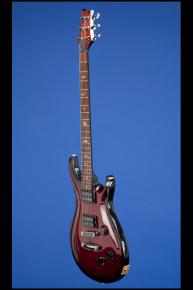A Unique 'Super-Thin' PRS 'Employee' Signature Guitar.
This 1993 PRS Super-Thin 'Signature' 'Employee' guitar with a 'Curly' Cedar body is just over 1 1/2 inches thick and weighs a mere 6.90 lbs. Thirteen-inch wide, one-piece PRS-shape offset asymmetrical double-cutaway curly cedar body with a sculptured top finished in a beautifully warm, yet very rich dark cherry. The back, sides and neck are finished in black. One-piece mahogany glued-in neck with a nut width of 1 11/16 inches, a very fast nedium-to-thin profile and a scale length of 25.00 inches. Dual-action truss rod. Back angled three-on-a-side non veneered headstock with inlaid abalone "Paul Reed Smith" signature logo on face. Single-layer black plastic truss-rod cover with one screw. Individual Schaller/PRS 'Rotamatic' locking tuners with half-moon metal buttons. Ten inch radiused rosewood fretboard with Abalone 'bird' inlays and 24 jumbo frets. One PRS Dragon 'Bass' Humbucker in the neck position and one PRS Dragon 'Treble' Humbucker in the bridge position with outputs of 7.92k and 18.16k respectively. The pickups are uncovered as usual. One volume control, one tone control one five-way rotary pickup selector switch. Black plastic barrel-shape "Speed" control knobs. The potentiometers are stamped "137 9251" & "137 9324" (CTS, December 1992 & June 1993). PRS Tune-O-Matic style bridge with individual metal saddles and separate stud-tail. This amazing guitar is in mint (9.50) condition. Housed in the original three-latch, rectangular black hardshell case with black leather ends and black plush lining (9.25).
This wonderful 'employee' guitar is based upon the 'Limited Edition' that appeared in 1989 and features a 'Curly Cedar' body but unlike the 'Limited Edition' the body does not have hollow tone chambers - but instead has a body that is a full one-half inch thinner (and lighter) than the usual 'Signature' or Limited Edition'. Just like the 'Limited Edition' it features Dragon humbuckers as oppose to the usual Standard Bass and Standard Treble found on the 'Signature' models. The Dragon Bass was designed for the neck position. The tone is perfect. This lower-output pickup has a combination of rich, warm bass with 'angelic' high end. Beautiful for solos. The Dragon is also our best Jazz pickup. Vintage alnico and vintage winding. [Suitable for] all types of music." The Dragon Treble is "Paul's personal favorite," said PRS. "Sounds great clean or high-gain. Fat, fat, fat with zero loss of clarity. The Dragon Treble uses a powerful ceramic magnet combined with our highest number of turns. [Suitable for] blues, rock, metal." Dave Burrluck. The PRS Guitar Book. p. 168).
"PRS staff have the opportunity after one or two years and then again after seven years with the company to request an employee guitar, specially made for them and supplied more or less at cost." (Dave Burrluck. The PRS Guitar Book, p. 84).
"While the Signature was originally planned as an open-ended model in terms of proposed production numbers, the Limited Edition has to be one of the rarest and least known PRS models. It was announced in 1989 and was the first PRS guitar to feature as standard a non-vibrato Tune-o-matic bridge and stud tailpiece (gold-plated only). The body of the Limited Edition had hollow tone chambers, but was without any f-holes. Although of Signature quality and price, the guitar introduced timbers for tops that were new to PRS, primarily cedar and redwood (although some even rarer examples are known in curly maple, and possibly even lacewood). The Limited Edition was intended as a limited run of 300 guitars. Smith explains: "We were trying to change up all the time, right? The tops for the Limited Edition were something brought in by Michael Reid [PRS's long-term wood supplier]. He'd found a log of redwood that had been in salt water for 15 years, and the curls in the figure were as large as my thumb. Then there was curly cedar and curly maple. We hollowed the bodies out and glued a quarter-inch back on them." The redwood-top guitars , however, proved problematic. "The wood had long grain lines that were once full of resin," says Smith. "Because the wood had soaked in salt water all that time the resin had gone, leaving these slots that we had to fill in with polyester finish." Both the Signature and the Limited Edition proved that there was a lucrative market for ultimate-quality limited-production guitars. It was a lesson well learned. "In reality," says Smith "we'd made enough. We wanted to keep them exclusive and we wanted to move on." (Dave Burrluck. The PRS Guitar Book, p. 47).











